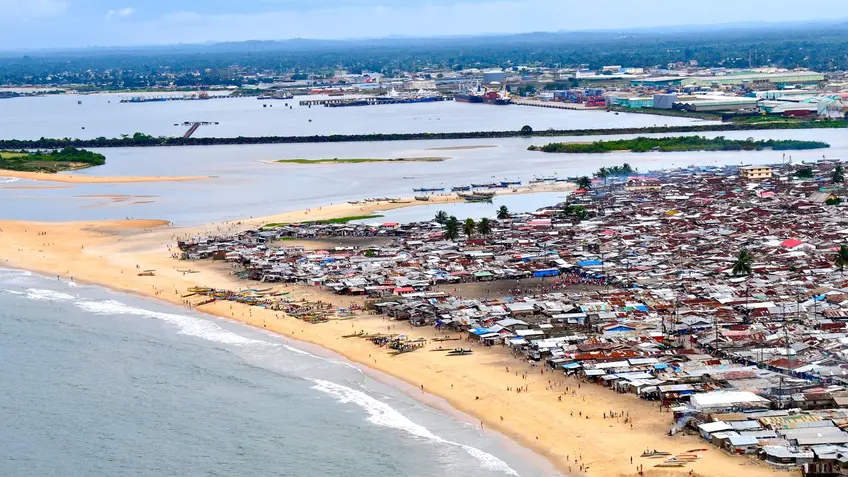Climate Action Drives Liberia’s Economic Recovery
In Liberia, as in many countries across the globe, we face severe socio-economic impacts from the dual crises of COVID-19 and climate change. These have made our ongoing efforts to recover from the prior economic disruption caused by the 2014 Ebola outbreak more challenging.
Despite recent moderate rebounds in economic growth and an abundance of natural capital, our economy has not yet recovered to even half of pre-2014 growth rates. Poverty and food security continue to pose significant challenges, which are exacerbated by the impacts of climate change and COVID-19. In addition, COVID-19's macroeconomic and financial impacts have adversely affected the achievement of many objectives set out in our National Development Plan—Pro-Poor Agenda for Prosperity and Development 2018 to 2023 (PAPD).
To respond to this dual crisis, we are working with all our ministries and a wide range of partners under the leadership of the Ministry of Finance and Development Planning to prepare a three-pronged response—an updated NDC, which we plan to release in June 2021; a revised PAPD; and a new Economic Recovery Plan (ERP).
In addition to vital health and employment measures like strengthening community health services, providing support for small and medium enterprises (SMEs), and delivering youth on-the-job training, the ERP mainstreamed climate change recommendations across a wide range of economic sectors, with support from the NDC Partnership’s Economic Advisory Initiative. In collaboration with the advisor, Prof. Jerome Nyenka, supported by Conservation International and the Government of the Netherlands, we identified more than 50 targeted climate actions and investments to integrate into the ERP. In addition to focusing on more traditional areas such as renewable energy, climate-smart agriculture, water and sanitation, climate-resilient infrastructure, and forest restoration and conservation, the ERP also integrates climate action considerations into the health, education, industry, and tourism sectors.
In Liberia, the whole of our government—not just the Environmental Protection Agency—views climate change as an economy-wide problem. Every day, we see that climate change is a health problem, an employment problem, an industry problem, and a human development problem. Yet we are not sufficiently prepared to manage climate change risks at the scale and increasing intensity that our country and our people experience them.
However, rather than seeing the pandemic as a reason to divert resources from climate action, we see it as a reason to increase our efforts, particularly given the high costs of inaction. While each identified ERP recommendation has an implementation cost, each also has much higher costs if we do not act. These may manifest as, for instance, higher long-term operation and maintenance costs, reduced agricultural productivity, or higher total energy costs.
Realizing that change starts with us, the first climate recommendation we will implement in our ERP is to establish an environmental unit within the Ministry of Finance and Development Planning. Next, we will work with several sectoral ministries on investing in climate research, technology, and innovation within the Ministry of Education and on strengthening climate action integration into the Environmental Social Health Impacts Assessment (ESHIA) process under the leadership of the Ministry of Health. We will then look to strengthen support at the subnational level by providing technical and financial support to develop climate-smart County Development Agendas (CDAs) and support a sub-national level coordination and monitoring program for the PAPD and ERP.
Climate action recommendations within the ERP also include critical measures at the county level, including investments in climate-smart cocoa production, agroforestry, renewable energy technology, and sanitary landfills and sustainable waste management at health facilities. Policies will be established to incentivize the private sector to adopt cleaner and more efficient production practices and technologies, require the use of climate-proofing construction materials in coastal infrastructure development, and ensure clear benefit sharing mechanisms for resources arising from forest carbon marketing. Across these investments and policies, we will work to ensure that considerations on gender, youth, children, and people with disabilities are mainstreamed in decision-making and implementation.
We believe this plan represents a major milestone on our path to a green recovery from COVID-19 and achieving our updated NDC targets. We also acknowledge that much more work is needed. In addition to finalizing our NDC update with support from the NDC Partnership, Conservation International, and IRENA, and continuing to better quantify and map our country’s natural assets through our new ‘Ecosystem Extent Maps’, we look forward to mobilizing finance for implementation and sharing our experiences with other countries in the Africa region and across the globe. Together, we can accelerate the transition to a more sustainable economy.
This blog was written by Benedict Kolubah, Assistant Minister of Development Planning, Ministry of Finance and Development Planning, Government of Liberia.
